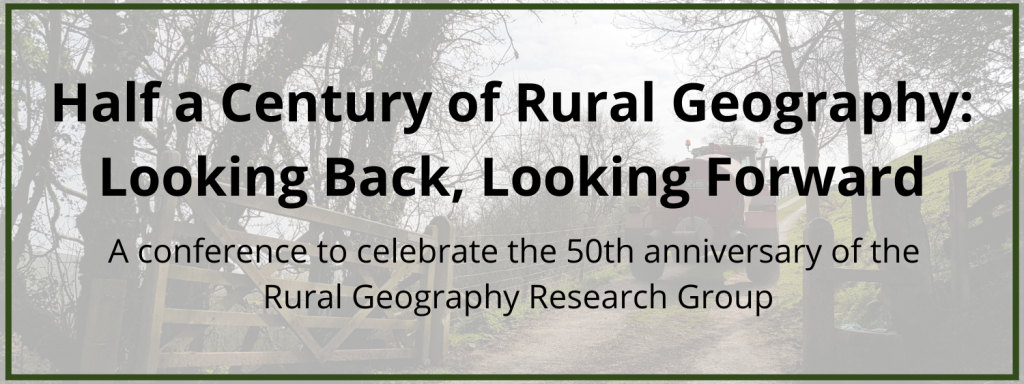
PROGRAMME ANNOUNCED
This year marks the 50th Anniversary of the proposal to establish what is now the Rural Geography Research Group of the Royal Geographical Society (with the Institute of British Geographers). To mark this event, the Research Group is planning to hold a mini-conference in Newcastle on the 29th and 30th August, in conjunction with the Annual Conference of the Royal Geographical Society. The first conference session will begin at 2pm on Monday 29th, with refreshments served from 1.30pm, and the event will conclude in the evening of Tuesday 30th August.
The research group emerged from an earlier formed Agricultural Geography Study Group, whose Committee decided in 1972 to propose to broadening its focus to encompass a wider range of “rural activities” (Coppock 1973, p. 74). Amongst the arguments advanced for the change at this time was the changing nature of agriculture, the impacts of urbanization, the growth of outdoor recreation and “the withdrawal of land from agricultural use” (Coppock 1972, p. 236). Half a century on, these issues are still prominent foci of study by rural geographers, although with many new and emergent conceptual, methodological, policy and practical ingredients, including alternative, automated, digital and sustainable agricultures; food geographies; counter-, peri- and planetary urbanisation; and rural tourism and the consumption, commodification and simulations of the countryside and rural living. In addition a series of new concerns and perspectives have emerged within studies of rural geography, including applied, critical, cultural, feminist, postcolonial, and non/more-than representational rural geographies; rural inequalities, exclusions and injustices; rural representations, cultures and lifestyles; poverty and homeless in the countryside; rural gentrification; rural land-grabbing; digital, globalised and financialised countryside; and more-than-human and environmental rural geographies. Less than a decade after the decision to transition from an agricultural to a rural geography study group, the latter had become one of the Institute of British Geographers’ largest (Lowe and Ward 2007), and many of its members were at the forefront of what has been described as a “resurgence” or “renaissance” of rural geography in the UK during the 1990s (Cloke 1997, p. 371; Lowe and Ward, 2007; 15).
Two decades on from this period, and half a century on from the development of the Rural Geography Research Group, is an opportune time to reflect on the past development of rural geography and its current character, as well as look forward to the future. The near future clearly holds many major challenges for rural areas and their inhabitants. The impacts of the Covid-19 pandemic, for instance, clearly hold the potential to accelerate and transform dynamics of rural change, as do the challenges of climate and environmental change and attempts to mitigate and adapt to them. There hence may be new, as well as long running, ‘moments of violence’ (Kasabov 2020: 143) facing many rural environments and their human, and more-than-human, inhabitants, as well as potentially emerging opportunities for ‘good’ (or at least better) countrysides (Shucksmith 2018) and quite different rural geographies.
A conference report will follow shortly.
References:
Coppock. J.T. (1972) Agricultural Geography Study Group. Area 4 (4), p. 236.
Coppock. J.T. (1973) Agricultural Geography Study Group. Area 5 (1), p. 74
Cloke, P. (1997) Country backwater or virtual village? Rural studies and the cultural turn. Journal of Rural Studies 13, 367-375.
Lowe P and Ward N. (2007) British rural geography: a disciplinary enterprise in changing times. In: Clout H. (ed.) Contemporary Rural Geographies: Land, Property and Resources in Britain; Essays in Honour of Richard Munton (London: Routledge), 1-20.
Kasabov, E. (2020) Ignored, silenced, caricatured, ridiculed, patronised, and hijacked: what next for a post-populist, post-Gilded-Age countryside. Journal of Rural Studies 75: 143-151.
Shucksmith, M. (2018) Re-imagining the rural: from rural idyll to Good Countryside. Journal of Rural Studies 59: 163-172.